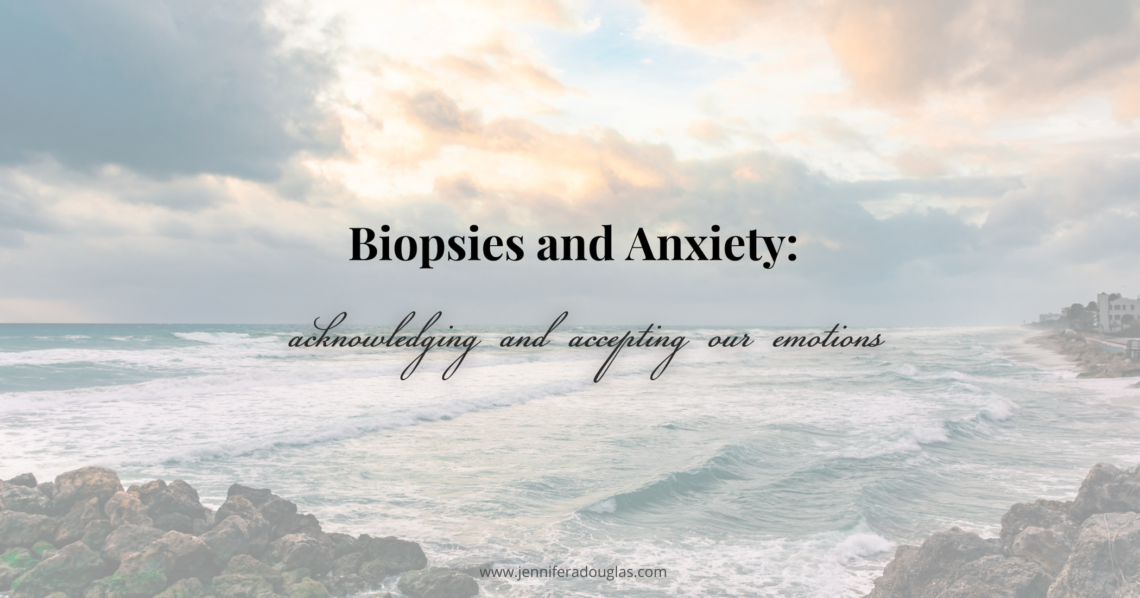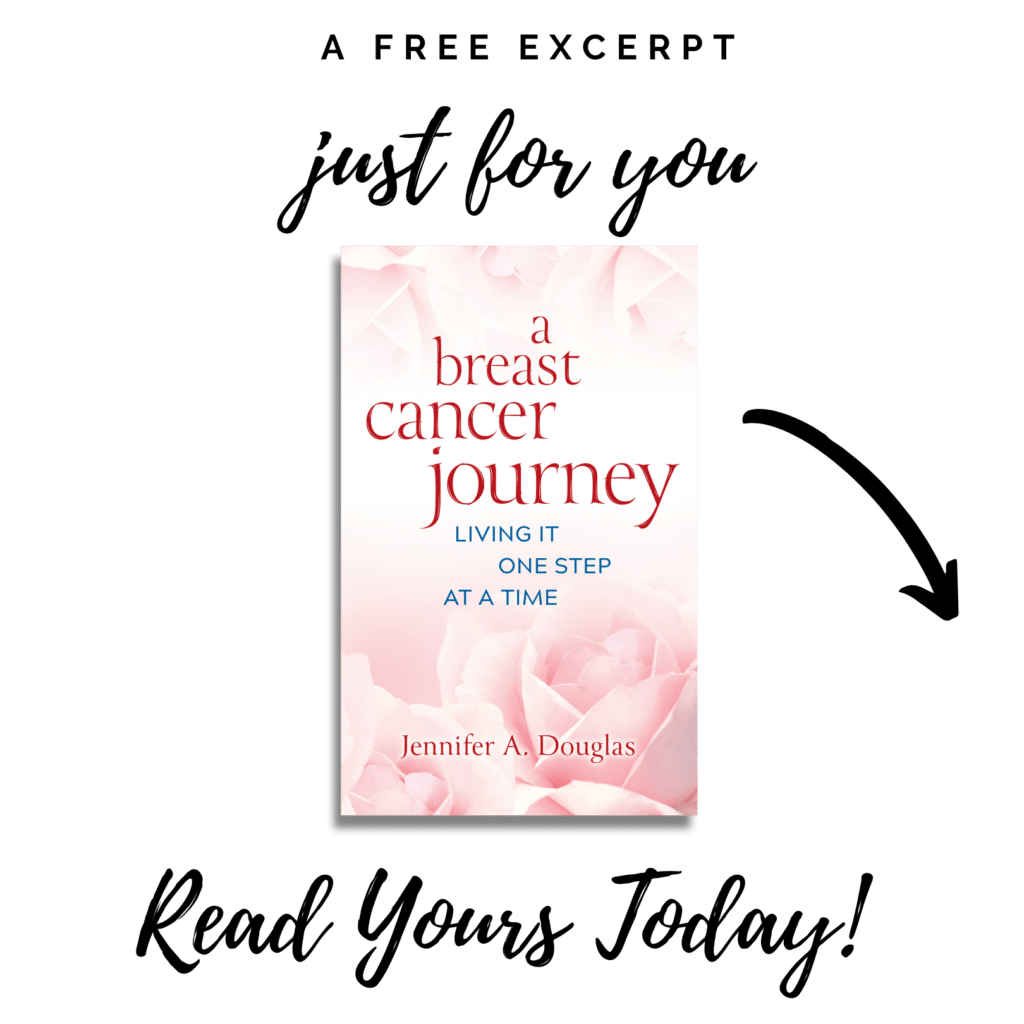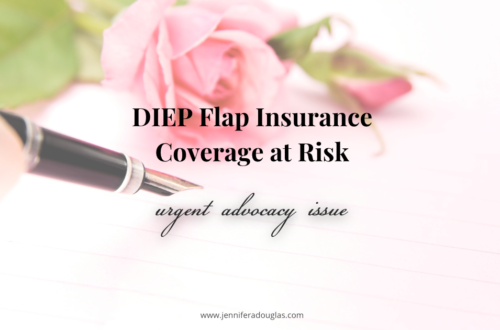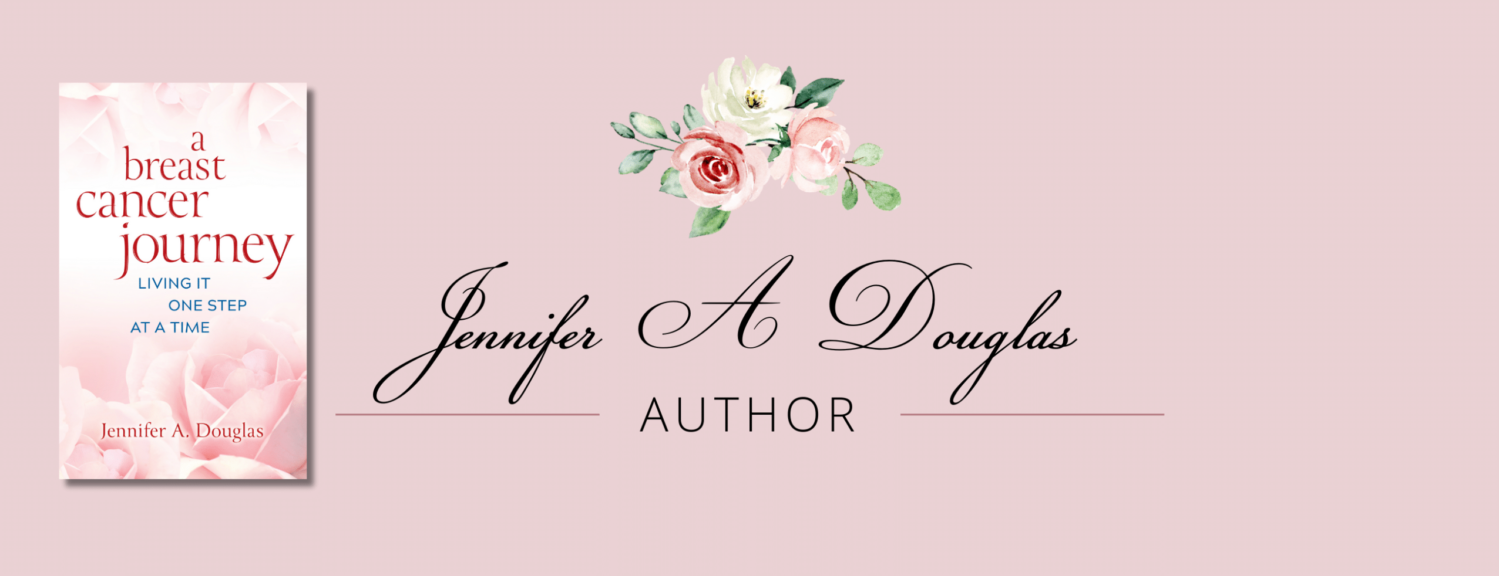
Biopsies and Anxiety: Acknowledging and Accepting Our Emotions
I don’t think it is a surprise that I can’t remember exactly how many breast biopsies I’ve had. I think it’s about seven—or maybe eight. I may not be able to recall the actual number, but I have no trouble remembering how I felt before, during, and after them. Those feelings are seared in my memory. It doesn’t take but a walk into the room I had one in to swirl in anxiety, stress, and fear. Breast biopsies can be an anxiety-provoking procedure for us. If thinking about a biopsy makes you feel anxious, you’re not alone.
It is understandable to feel anxiety with this procedure, and I feel like we don’t talk about that enough. Sometimes I’ll be on a support group discussion, and someone who hasn’t yet been diagnosed with cancer chooses to share her anxieties over the procedure. Most of the time, the other group members will rally around in support and encouragement.
And then, there’s sometimes that one person who says, “Oh, it’s no big deal.”
Don’t be that person.
Acknowledging our Anxieties
There is nothing wrong with feeling anxious about biopsies. It may be your first time going through the procedure. Or it could be your tenth. If you’re feeling anxious, you’re feeling anxious. No amount of minimizing, using the word “just,” or thinking positively will help. Especially if someone else tells us how we should feel going into a procedure.
Let’s think about it. We’ve been sent to a procedure that may diagnose us with cancer, and we need to be awake for it. We will see the medical team around us, feel the burning as they numb us with a local anesthetic, smell the alcohol as they prep the area, feel the pressure of the collection device going in, and hear the clicking or whirring as part of us is removed.
Yeah, it’s no wonder we might feel anxious about a procedure like that.
I wish I could say it would improve the more biopsies we go through. I can say that I can better manage my anxieties as I face the biopsies. But the anxiety is definitely there. And if anything, it is worse. I know what it is like to be diagnosed. I don’t ever want to feel that again. So, when I walk into that room for another biopsy, I feel anxious. Sometimes I’m downright terrified. I may not be walking into a procedure that will physically cause me excruciating pain, but the emotional and mental pain is real.
So, yes, I feel anxious about biopsies.
I also hate them with a passion.
I wish I didn’t have to endure them. I wish I didn’t have to be awake during them. I wish I didn’t have to hear the biopsy machine click as it takes my sample. I long for it to be over so I can retreat into a comfortable and safe space.
The Trauma of Remembering
I didn’t think I had medical trauma after my DCIS diagnosis until I faced my first post-treatment biopsy in 2022.
I’ll never forget the moment the medical team left me alone in the room where I had passed out during my mammogram-guided biopsy in 2019. I was there to sign a consent form for my 2022 biopsy. But all I could feel was the room closing in on me. My heart raced. I was in the chair again, feeling my ears fill up with cotton, losing my grip on my surroundings, coming to with the orange juice in my mouth and sobbing.
Being in that room again brought it back like I’d never left. The moment was three years ago, but my brain didn’t know time had passed. I was in a panic, and I hadn’t begun the biopsy procedure yet. Even writing about it raises my heart rate and causes the muscles in my chest to clench up.
So, if you’re wondering if feeling anxiety when facing a biopsy is normal, my answer is yes.

Accepting Our Emotions
So, what do we do? Should we run away or refuse the procedure?
Well, I suppose we could. ((But it certainly isn’t recommended))
But what if there was a different way?
What if:
- We approached our emotions with compassion and care.
- We accepted our emotions as normal and part of the process.
- We acknowledged the feelings we are having instead of masking them.
- We asked for the support we would like before, during, and after the biopsy
- We allowed ourselves the space to recover mentally, physically, and emotionally.
I now expect the anxiety as I approach a biopsy. I plan for it and clear space in my calendar to ensure I can take the time to care for my emotions.
I also make sure that I surround myself with people and activities that will be helpful for me.
Some of my strategies include:
- Bringing my husband, who will be the source of strength and humor I need as I head into procedures I hate.
- Making sure to stock my phone with plenty of fun games
- Bringing water and crackers with me so I can snack right after the procedure
- I do not research the procedure in the waiting room.
- Staying off of social media
- Putting my phone on do not disturb so I am not constantly answering texts.
- Making sure to let the medical team know that I am feeling anxious.
- Informing the team that I have passed out before during the procedure.
- Talking about my comfort as needed before and during the biopsy.
- I meditate, pray, and use deep breathing techniques to help me.
All of these help me in my process of accepting my emotions and designing strategies for getting through the biopsy.
Other Perspectives on Biopsies
When I talked about this topic on Twitter (X), I had some fellow cancer survivors share their perspectives. What was interesting was the diversity in approaches. We all face this cancer process differently and feel different emotions.
- “Had wonderful team Dr & nurse eased my anxiety. Watched the whole procedure & named Breast Shark & Lymph Alien. What did get to me was my GP who refused to discuss results even when forced him to show me he contradicted results ‘Not necessarily.'”@ArtMarieCalais (source)
- “I didn’t cope and still don’t…I take it 1 day at a time..after the double mastectomy, I just wanted everything to be over, now I’m in radiation…just let this nightmare end” @Freddie56Keefer (source)
- “A Valium 15 mins beforehand worked for me” @malefitness (source)
- “I wasn’t anxious about it. It was obvious I had breast cancer so it was a necessary procedure to get type of cancer.” @benn_elisbenn (source)
- “For the first few years after completing treatment, I think I had biopsies recommended at every annual mammogram (because they saw something suspicious). I clearly remember one time this happened – they saw something suspicious in the “non-cancer” breast. As soon as they came in and said they wanted to do a biopsy, my stomach dropped. For me, the “post-treatment” biopsies were worse, because I knew what a positive biopsy result would mean. My original diagnosis was Stage 3 TNBC when I was 36. Especially during those first years after I finished treatment, I knew that a recurrence would not only mean more treatment, but that it would greatly increase the odds that the recurrence would be terminal. The fear is real, and perhaps at than my initial diagnosis, because I now KNOW what a positive biopsy result would mean. My kids know what it would mean, and my husband knows that we’d have to face the slog of treatment all over again, but this time with less confidence that I’d recover.”- @rmmilman via DM to the author. Shared with permission.
- “My thoughts have nuance/layers of emotions – it’s a level of anxiety that can be pretty high (!!) – but for me the concept remains one of “would I rather NOT have the opportunity to know”? Yearly screenings and diagnostic imaging for almost 25 years now; each time is anxiety provoking but I’ll take that any day over not having the testing.” (shared anonymously)
- “Anxiety after a cancer diagnosis can be awful. 5 years down the line I still have anxious days. Re core breast biopsies….ow! Quite traumatic as you know they are thinking its cancer, and they are painful! They could use more local and maybe some sedation. Xxxx” @LindsayJane70 (source)
- “Not well. Honestly, I go numb for a while. Keep busy doing things that don’t require much emotional presence. Exercise if I can make myself.” @SPMazrui (source)
- “I kept almost passing out during the biopsy, they had to lay me on my side and go in from above. I apologized profusely but they kept saying it was fine and it happens a lot because of nerves. So why not change the way they’re done, then?
Going in from the top/side worked out better as well. The methods are flawed.” @amour_de_porc via DM to author. Shared with Permission
As you can see, there is no wrong way to feel or to try to get through these challenging procedures.
Anxiety, Rest, and Recovery after a Biopsy
After my first biopsy, where I passed out, I was so determined to return to my regular activities that I overdid it with physical exertion. I remember going out for a walk and not getting but a few steps from my house and realizing that I was dizzy, exhausted, and unable to walk like I wanted.
I was so frustrated that I was feeling so weak.
That frustration didn’t help me recover. And the exertion only made my biopsy site bleed more than usual. I was back in the radiology office a day later, worried about it. The radiologist wrapped me up to add some extra compression to the area and then told me, in no uncertain terms, that I needed to take it easy. My body needed rest to heal.
But I didn’t want to rest because the anxiety would roar back. I was worried about the results, and I figured if I could do all my normal activities, then it would be okay.
As I took her advice reluctantly, I began to design recovery strategies prioritizing rest. However, as I rested physically, I realized I needed ways to cope with my anxiety as I waited for the results.
It wasn’t easy, but I found several things that lowered my stress and anxiety.
Here are a few of the things that helped me:
- Watch a tv show
- Color a mandala on my iPad
- Play games on my phone or iPad
- Call a supportive friend or family member
- Do a jigsaw puzzle
- Write in a journal
- Enjoy a cup of herbal tea
- Meditate
- Read a fun fiction book
It also helped me to understand when I would get my results. I prefer to discuss the biopsy results with my surgeon in an appointment, so I ensure I have that on my calendar. Although, that doesn’t always work because sometimes those pathology results will be delayed.
The delays were always hard to deal with. There was nothing quite like the spike of anxiety I would feel because the results weren’t ready.
I wrote about how I dealt with the delays in a few other posts:
It’s normal to feel anxious and worried when facing a biopsy. I’ve had many of them, and thus far, one has shown cancer. The curious thing is that when I think about biopsies, I don’t comfort myself with the thought that “it might not be cancer.” Even though that is true, that statement doesn’t help me with my feelings of worry and anxiety.
What does help me is to approach my feelings with gentleness and care. I allow them space to exist and design strategies to help me move through them and endure the procedure. I understand why biopsies are essential, so I’ll proceed, even though I hate them!
Jennifer Douglas
Jennifer is the author of "A Breast Cancer Journey: Living it One Step at a Time," breast cancer survivor, and patient advocate. Her book, published in 2023 by Bold Story Press, is an encouraging guide for breast cancer patients. It contains first-hand information, organized by topics, to help readers navigate the diagnosis, treatment, and recovery from breast cancer. Her writing emphasizes emotional, mental, and physical well-being along with empowered decision-making.


You May Also Like

Lumpectomy 2022: Another Step In The In-Between
August 5, 2022
Another Biopsy: Not On My List of 2022 Summer Fun!
June 30, 2022
